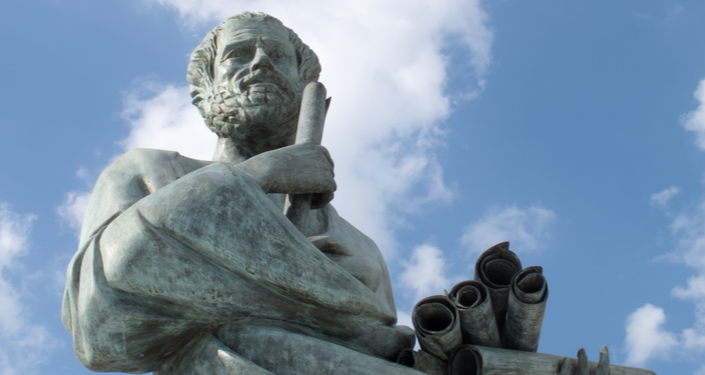By Dr Tim Dean
The connection between philosophy and canny business decisions goes all the way back to the 6th century BC with Thales of Miletus, noted as being the first Greek philosopher. After being ridiculed for allegedly falling into a hole during intense preambulatory meditation, he demonstrated the power of careful thinking by predicting a bumper olive crop and buying up all the olive presses in the region. Thus, when the harvest proved bountiful, he got his own back by leasing out the press at a premium and subsequently became quite rich.
To this day, philosophy is still rather uncharitably perceived as being a pursuit for idle reflection rather than practical concern. But, as Thales demonstrated, the application of a little careful thinking can be highly fruitful to your business.
Why? Why? Why?
Philosophy starts with the simple question “why?” But instead of settling on the first convenient answer, it continues to ask “why” until it reaches the limits of our understanding. This can be unsettling, but it can also be liberating. As the 20th century English philosopher Bertrand Russell noted: “Philosophy, though unable to tell us with certainty what is the true answer to the doubts which it raises, is able to suggest many possibilities which enlarge our thoughts and free them from the tyranny of custom.”
Liberation from the “tyranny of custom” is pertinent in this age of innovation and disruption. Innovation requires us to break free from the constraints of conventional thinking to try something new. We are all too easily stuck within the dominant conceptual framework that blinds us to new opportunities.
If you want your colleagues to be innovative, it pays to cultivate a healthy dose of philosophical scepticism as a part of your organisation’s culture. As a leader, you can promote that culture by not only questioning others but by conspicuously questioning yourself. You can acknowledge the limits of your own knowledge and invite others to test your – and their – ideas in an atmosphere of open enquiry.
One question that is worth asking is why you do what you do in your organisation. That sounds rather broad, but it can be applied to any particular practice within your organisation, whether it be “why do we sell product X or provide service Y?” or “why do we operate during the hours we do?”
A key distinction to help answer questions like these was highlighted by the 20th century American philosopher Christine Korsgaard, who built on the work of Aristotle. Korsgaard drew a clear distinction between “instrumental goods,” which are good because they lead to something else we desire, and “final goods,” which are good in and of themselves.
Money is a classic example of an instrumental good, because (most people) want money for what it can buy rather than for the sake of possessing it. Final goods might be friendship, health or what Aristotle called “eudaimonia,” which is roughly translated as “human flourishing.”
It’s easy to conflate the two, such as by assuming that an instrumental good is a final good. I worked with some safety consultants to help overcome the pushback they were experiencing from their clients. When I asked them why they do what they do, they answered that safety was inherently important. This revealed that they considered safety to be a final good – as if it was desirable in and of itself – and that didn’t resonate with their clients, who saw safety as a nuisance and a sunk cost. But when the consultants started talking about safety as an instrumental good – one that is good because it saves lives, minimises reputational damage and preserves property – they were much better received.
It can also be illuminating to apply Korsgaard’s distinction to think about
the final goods that your products or services promote. You might think you’re selling financial services, but really you’re selling peace of mind. That might inform how you deliver your services, such as by spending more time identifying final goods that your customers care about and tailoring the way you communicate so the financial services are seen to be instrumental towards those goods.
Virtuous leadership
Speaking of Aristotle, it would be remiss to talk about philosophy in leadership without mentioning ethics. Many organisations follow a code of ethics, but it’s unwise to assume these codes are sufficient to promote ethical behaviour across the board. In fact, if you impose too many rules, you take away your colleagues’ ability to make ethical decisions for themselves.
This is where Aristotle’s approach to ethics can be useful. Rather than suggesting we follow a strict system of rules, Aristotle argued that we should aim to cultivate virtues in ourselves and others, such as patience, honesty, courage and charity. By creating a virtuous workplace, you become less reliant on rules, regulations and procedures, and are empowering your colleagues to take responsibility for their actions. You can create a culture of virtue within your organisation by exemplifying virtuous behaviour yourself and rewarding it (and not punishing it) in others.
Ultimately, the value of philosophy in leadership is in freeing yourself from the constraints of your assumptions, in eroding a false sense of certainty that poisons innovation, in improving the rigour of your thought and promoting a virtuous workplace. And it all starts by asking “why?”
Dr Tim Dean in a Sydney-based philosopher, writer and regular contributor to New Philosopher magazine.



